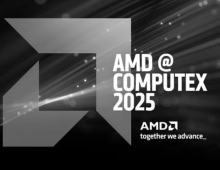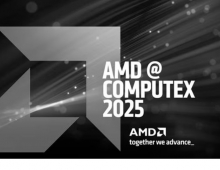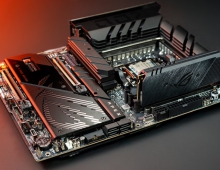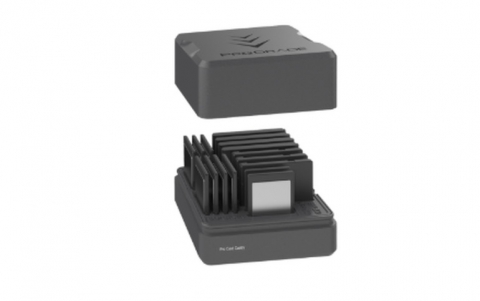
AMD To Launch Zen Platform At CES 2017, New Socket-compatible 7th Generation Pro chips Launch Now
Following the recent releases of the Bristol Ridge-based desktop processors, AMD's Zen-based CPUs and the corresponding high-end X370 chipsets will debut at CES 2017 in January. But until then, the new 7th Generation Pro chips are launching today, offering PC users an upgrade to Zen chips. To achieve a smooth transition, AMD has begun adjusting product prices in order to accelerate inventory digestion. Zen-based products are expected to start shipping after February.
Zen-based processors will be manufactured on Globalfoundries' 14nm FinFET process, featuring an eight-core-16-thread design. AMD will initially release Zen-based high-performance desktop processors (Summit Ridge), while one for notebooks is scheduled to launch at the end of second-quarter 2017.
The high-end X370 chipsets will be launched at CES 2017, while mainstream B350 and low-end A320 will be unveiled later. X370-based motherboards will begin shipments in December.
7th Generation AMD PRO Processors
AMD also today announced at the Canalys Channels Forum the first PCs featuring 7th Generation AMD PRO APUs (formerly codenamed "Bristol Ridge PRO"). The new Pro chips are for business desktops, and will appear in PCs from HP and Lenovo. The ability to easily upgrade is a big deal because it lets users avoid buying new PCs in order to get the Zen chips when they come out.
New systems from HP and Lenovo combine commercial-grade performance, and stability, with advanced video (4K) and audio capabilities. In addition, Microsoft Windows 10 Pro features including Device Guard, Windows Hello, Biometric Security and BitLocker Encryption are fully supported, out of the box.
The 7th Generation AMD PRO processors feature a dedicated and integrated AMD Secure Processor technology; a system-wide secure environment that offloads and isolates security functions, providing an independent hardware-based root of trust for secure boot, content protection, application security, and fTPM 2.0 (firmware trusted platform module).
The new desktop processors provide up to 14% more compute and 22% more graphic performance while being up to 32% more energy efficient than 6th generation AMD PRO processors
.The chips will be compatible with the AM4 socket, which provides the basis for upgrades to Zen.A 65-watt Pro chip consumes 32 percent less power than earlier generations of the AMD Pro, but speeds up CPU performance by 14 percent and graphics by 22 percent.
The new lineup includes seven AMD A12, A10, A8 and A6 Pro chips. They will be used in HP's Elitedesk 705 G3 desktop, which will be available in tower PC and mini-desktop models.
| 7TH GEN AMD PRO A-SERIES DESKTOP ACCELERATED PROCESSORS | |||||||||
|---|---|---|---|---|---|---|---|---|---|
| AMD APU Model (click for details) |
Graphics | CPU Cores | GPU Cores | CPU Clock Speed | GPU Clock Speed | TDP | Total L2 Cache | Memory | Display Capabilities |
| AMD PRO A12-9800 | Radeon R7 | 4 | 8 | 4.2/3.8 GHz | 1108MHz | 65W | 2MB | DDR4-2400 | HDMI 2.0, DisplayPort 1.2, DVI |
| AMD PRO A12-9800E | Radeon R7 | 4 | 8 | 3.8/3.1 GHz | 900MHz | 35W | 2MB | DDR4-2400 | HDMI 2.0, DisplayPort 1.2, DVI |
| AMD PRO A10-9700 | Radeon R7 | 4 | 6 | 3.8/3.5 GHz | 1029MHz | 45/65W | 2MB | DDR4-2400 | HDMI 2.0, DisplayPort 1.2, DVI |
| AMD PRO A10-9700E | Radeon R7 | 4 | 6 | 3.5/3.0 GHz | 847MHz | 35W | 2MB | DDR4-2400 | HDMI 2.0, DisplayPort 1.2, DVI |
| AMD PRO A8-9600 | Radeon R7 | 4 | 6 | 3.4/3.1 GHz | 900MHz | 45/65W | 2MB | DDR4-2400 | HDMI 2.0, DisplayPort 1.2, DVI |
| AMD PRO A6-9500 | Radeon R5 | 2 | 4 | 3.8/3.5 GHz | 1029MHz | 45/65W | 1MB | DDR4-2400 | HDMI 2.0, DisplayPort 1.2, DVI |
| AMD PRO A6-9500E | Radeon R5 | 2 | 4 | 3.4/3.0 GHz | 800MHz | 35W | 1MB | DDR4-2400 | HDMI 2.0, DisplayPort 1.2, DVI |
The 7th Generation Pro chips support DDR4 memory, NVMe SSD storage, USB 3.1, the USB Type-C slot and other new technologies.
AMD's Pro chips are comparable to Intel's vPro chips. The Pro chips have remote management and security features based on the DASH (Desktop and Mobile Architecture for System Hardware) standard, which is widely used in servers. DASH shares many features with vPro, such as the ability to wipe out or shut down remote PCs that may have been stolen. But DASH isn't widely used yet, with Intel's vPro dominating the business PC market.
Under the guidance of CEO Lisa Su, AMD's performance has started to improve since early 2016. In addition to stable income from its semi-custom solutions, AMD has been receiving licensing fees in China, has formed joint ventures and sold testing and packaging plants. AMD's Polaris-based GPUs have also helped the company to raise its market share in the discrete graphics card market. AMD's market share rose 4.8pp sequentially to reach 34.2% in the second quarter, according to Mercury Research.
However, AMD's gross margins from the GPU sector are still far weaker than Nvidia's and the situation is unlikely to improve until AMD's next-generation Vega-based GPUs to hit the market in 2017.





















